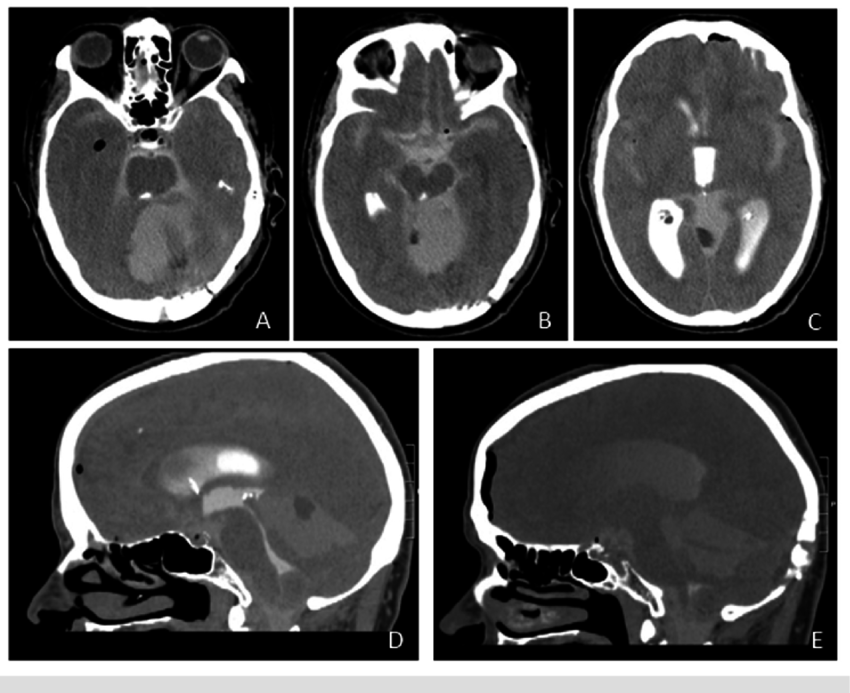
A CT Cisternogram is a specialized imaging test used to evaluate the flow of cerebrospinal fluid (CSF) in the brain and spinal cord. It is particularly useful for detecting leaks of CSF, diagnosing conditions like spontaneous cerebrospinal fluid leaks, or assessing conditions such as hydrocephalus.
The procedure involves injecting a contrast dye into the subarachnoid space, typically via a lumbar puncture, to highlight CSF pathways. The patient is then scanned using a CT scanner to produce detailed images of the brain, spinal cord, and surrounding areas. This test is minimally invasive and provides critical information for diagnosing and managing CSF-related disorders.
INDICATIONS :
•
CSF leaks : To diagnose and localize cerebrospinal fluid leaks.
•
Hydrocephalus : To evaluate
the patency of the CSF pathways and diagnose hydrocephalus.
•
Cranial nerve disorders : To evaluate the
relationship between cranial nerves and surrounding CSF spaces.
•
Brain tumors : To evaluate the extent of brain tumors and their relationship with
surrounding CSF spaces.
•
Infections : To diagnose and evaluate the extent of
infections, such as meningitis or abscesses.
CONTRAINDICATIONS:
•
Allergy to contrast : Patients with a known allergy to iodine-based
contrast agents may not be suitable for CT Cisternograms.
•
Kidney disease: Patients with severe kidney disease may not be suitable for CT
Cisternograms due to the risk of contrast-induced nephropathy.
•
Pregnancy : CT Cisternograms are
generally avoided during pregnancy due to radiation exposure.
PREPARATION :
•
Fasting : Patients may be
required to fast for several hours before the test.
•
Removal of metal objects : Patients will be asked to remove any metal
objects, such as jewelry or clothing with metal fasteners.
•
Lumbar puncture : A lumbar puncture (spinal tap) may be
performed to inject contrast agent into the CSF spaces.
PROCEDURE :
1. CT scanning :
The
patient will lie on a table that slides into a large, doughnut-shaped machine.
The CT scanner will rotate around the patient, taking X-ray images from
different angles.
2.Contrast agent administration : The contrast agent will be administered
through the lumbar puncture, and the patient will be asked to remain still for
a few minutes.
3. Imaging: The CT scanner
will take images of the brain and CSF spaces.
RISK AND COMPLICATIONS:
1.Radiation exposure : CT Cisternograms
involve radiation exposure, which may increase the risk of cancer.
2. Contrast agent reactions : Some patients may experience allergic
reactions or kidney damage from Athe contrast agent.
3. Lumbar puncture complications : Lumbar puncture may cause headache, nausea, or vomiting.
•Normal
results : A normal CT Cisternogram will
show normal CSF spaces and no evidence of leaks or blockages.
•Abnormal results : Abnormal results may indicate CSF leaks,
hydrocephalus, or other conditions affecting the CSF spaces.
DIAGNOSTIC BENEFITS :
1.
Accurate diagnosis : Cisternograms provide detailed images of the cerebrospinal fluid
(CSF) spaces, helping doctors diagnose conditions such as CSF leaks,
hydrocephalus, and brain tumors.
2. Localization of CSF leaks : Cisternograms can help identify the exact location of CSF leaks,
which is essential for planning treatment.
3. Evaluation of CSF dynamics : Cisternograms can
assess CSF flow and pressure, helping doctors diagnose conditions such as
hydrocephalus.
TREATMENT BENEFITS :
1. Surgical planning : Cisternograms
provide detailed information about the anatomy of the CSF spaces, helping
surgeons plan and execute surgical interventions.
2. Monitoring treatment response : Cisternograms can
be used to monitor the response to treatment, such as shunting for
hydrocephalus.
3. Reducing complications : Cisternograms can
help reduce complications during surgery by providing detailed information
about the anatomy of the CSF spaces.
PATIENT BENEFITS :
1. Minimally invasive : Cisternograms are
minimally invasive, reducing the risk of complications and promoting faster
recovery.
2. Quick procedure : Cisternograms are
relatively quick, taking about 30-60 minutes to complete.
3. Detailed images : Cisternograms
provide detailed images of the CSF spaces, helping doctors diagnose and treat
conditions more effectively.
